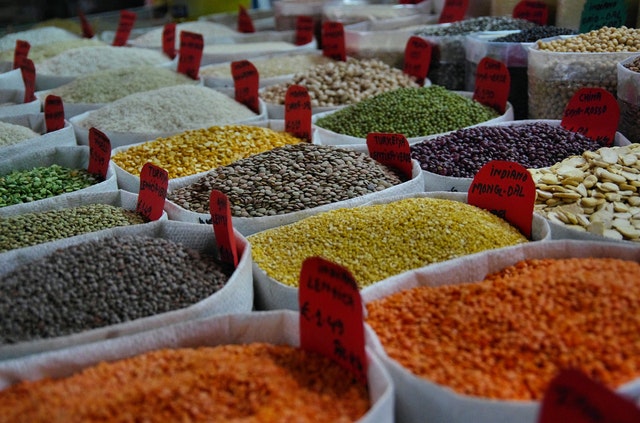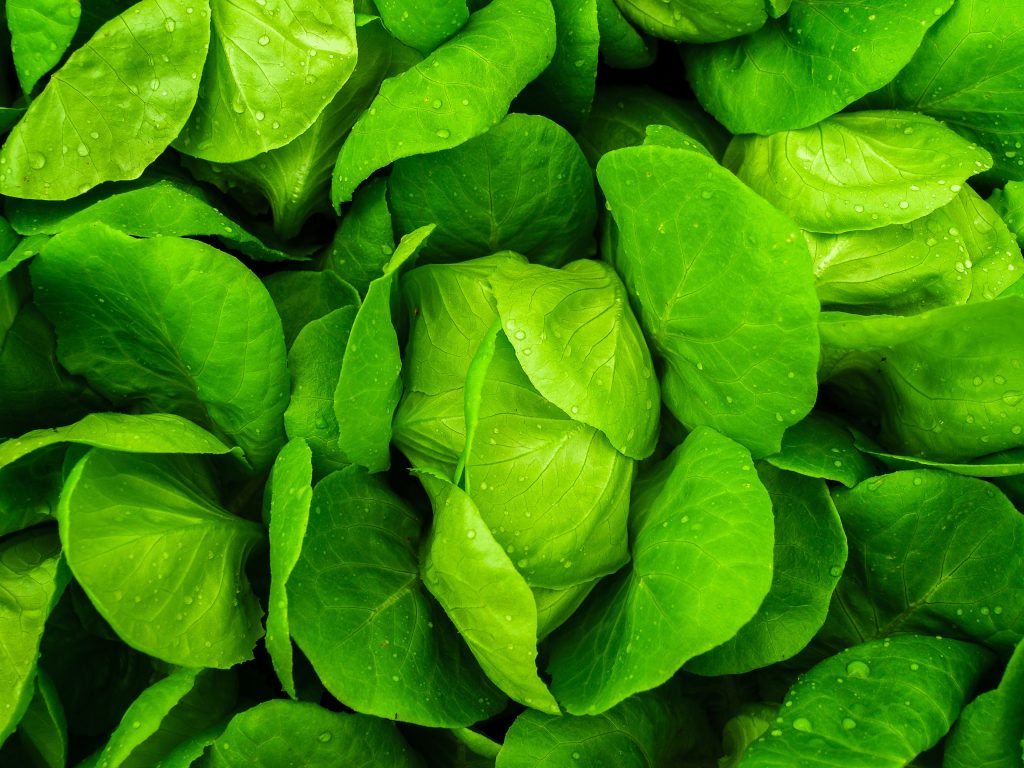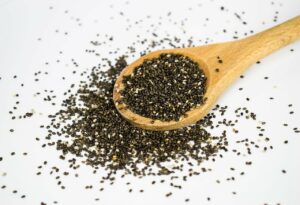We are not nutritionists and offer only information related to nutrition that can be found elsewhere on the internet.
Whether you’re new to veganism or a long-time vegan already, you will likely have heard assurances that vegans obtain all the nutrients they need from plant sources and you will also have heard concerns about nutrients lacking in vegan diets. It is certainly true that is possible for vegans to be perfectly healthy, but it is also true that we do need to be aware of certain nutrients and deficiency risks. ‘Protein’ in general, is not one of them. Gone are the days when people thought you had to combine your meals in certain ways in order to obtain sufficient protein. However, there is one building block of protein, (amino acid) in particular, that you should know about. Below are 9 essential nutrients that are absolutely worth your time and consideration.

- Lysine:
It is indeed very easy to fulfil the daily protein requirements on a vegan diet in terms of the grams of protein required, but do you know exactly which amino acids are making up your daily quota? Lysine is the amino acid which is often in shorter supply in most plant foods, and therefore lacking from your diet, unless you make sure to include it. Almost all plant foods contain elements of all the essential amino acids, but in varying quantities, with lysine tending to fall short. For this reason, it is referred to as the ‘limiting amino acid’. It is generally recommended that vegans focus on obtaining sufficient daily quantities of lysine above any other amino acid, since focusing on the consumption of foods containing the highest amounts of lysine almost completely guarantees sufficient quantities of all other essential amino acids.
Lysine helps the body to absorb calcium, iron and zinc and helps to support a healthy immune system.
A lack of sufficient lysine can lead to fatigue, nausea, poor concentration, hair loss and anaemia among other issues.
Lysine is also important for the creation of collagen, the building blocks which keep skin supple and wrinkle-free, – and who doesn’t want that?
Great sources of lysine include lentils (that good old vegan staple!), amaranth, pumpkin seeds, both split and green peas and beans such as garbanzos (chickpeas), kidney beans and pinto varieties.
- B12
This is the vitamin that gets the most attention but is still easily overlooked. And trust us, you don’t want to risk a B12 deficiency! This vitamin is crucial to the production of red blood cells, DNA and aids with the function of your nervous system. Symptoms include weakness, fatigue, poor concentration and memory loss, breathlessness and dizziness. Other common symptoms are a change in mood, feelings of depression and even potentially the onset of dementia. When the body has suffered a lack of this essential vitamin for long enough, it can lead to irreversible nerve damage. You may have heard of pernicious anaemia, this is an incurable form of anaemia for which sufferers need lifelong medication. Pernicious anaemia is very serious, and often symptoms of a B12 deficiency are very subtle and easily dismissed as having other causes. A common misconception among the vegan community is that you can obtain enough B12 to meet requirements from eating unwashed vegetables, but this simply isn’t true. Planks milks such as soya and almond milk are nearly always fortified with B12 too, and in some cases this may be enough, as the body’s daily requirement for B12 is very small. However, how much you absorb is going to depend on many factors, including how much milk you drink, so to be on the safe side it is always wise to take a supplement. What most people don’t realise is that in large scale animal agriculture, where the majority of beef products come from, the cows are actually supplemented with B12 in their food or in injection form, and this is where meat-eaters get their B12 from. Vegan supplements for B12 can be in the form of an injection that lasts for several months, or a tablet that dissolves under the tongue which you can take every few days or so.
- Calcium.
This is a big one! Unfortunately, relying on soya milks for this one is not the answer as not only do most fortified plant milks not contain enough of this essential mineral, they actually contain calcium triphosphate, which is not as easily absorbed by the body. If you aren’t eating vegetables such as broccoli and bok choy on a regular basis then definitely consider taking a supplement. Be careful though, as consuming too much calcium can be just as bad for you as having too little and may lead to kidney stones.
Other top sources of calcium include turnip greens, collard greens, kale. (which are the low oxalate greens) and spinach. Steaming these vegetables will lower the oxalate levels further and may increase the bioavailability of other nutrients.

Greens, source of calcium.
- Iron
This is an obvious one but still needs to be mentioned, as a lack of iron can lead to some pretty serious health issues. Heme iron, the kind of iron found in meat and animal products is more easily absorbed by the body, but that doesn’t mean that it’s difficult to fulfil iron requirements with plant sources. It is generally thought wise to consume around 1.5 to 1.8 times the recommended daily amount however, certainly in females, to account for both the iron lost during menstruation and potential absorption issues. This does not mean, however, that vegans are more likely to be anaemic. In fact, you are no more likely to develop anaemia than meat eaters!
Good sources of iron include lentils (again, – see, there’s a reason they are often associated with vegans), beans such as kidney beans, pinto beans and navy, molasses, spinach, swiss chard, almonds and cashews and grains.
Some dried fruits, such as dried apricots and prunes are also high in iron, – but don’t overdo these as they are also high in sugar.
Adding a source of vitamin C to your iron-rich meals can really help absorption. Vitamin C binds to the non-heme iron found in plant foods and the body then absorbs them together. A very simple way to consume vitamin C together with iron sources is by sprinkling some lemon juice on your greens, – tasty!
If you can get some, cooking your foods in cast-iron pans also helps to infuse the food with extra iron. Males such be careful with this one though, as they are more likely to over-consume iron.

Kidney beans
- Iodine
This essential trace mineral is getting more attention generally within vegan circles these days, but it still doesn’t seem to be talked about enough. Iodine is fundamental to your health because it’s what the hormones produced by your thyroid are made of. It supports your immune system and metabolism and supports the healthy development of bone and brain during pregnancy and infancy. Insufficient iodine is the leading cause of hyperthyroidism. A lack of iodine leads to hair loss, weight gain, fatigue, cognitive decline, sensitivity to cold and dry skin among other adverse effects. Non vegans obtain some of their iodine from drinking milk, though it is not the milk itself that is the source of the iodine, but rather that the milk is contaminated by the iodine used to clean the milking machines. However, iodine deficiency is a health risk for all and many countries around the world have identified it as a health concern. For this reason, many countries add iodine to table salt. This is very common in the USA but not so much in the UK, though several supermarkets now stock iodised salt, so it wise to add some to your diet. Seaweed is the best concentrated source of iodine, with kelp and dulse generally containing the highest amounts, and of course with it being a plant food it has a lot of other great nutrients too.
- Zinc
Zinc is vital to the body for a lot of reasons! It is involved in protein synthesis, healing processes, the function of enzymes, cell division and the ability to smell and taste. It also helps with the maintenance of a healthy immune system, supports the retina for healthy eyes, regulates how neurons interact with each other in the brain and is a powerful antioxidant. In males it is fundamental to the function of the testes, as it helps to produce testosterone and supports the production of healthy sperm.
A zinc deficiency causes dry skin, hormonal imbalances, brittle nails and hair, delayed healing of wounds and can accelerate the aging process. Other effects include fatigue, depression, diarrhoea, a poor memory and cravings for sweet and salty foods. Wow! That’s a lot of avoidable problems! Low levels of zinc can also adversely affect the libido in both males and females, so that’s another good reason to ensure adequate intake.
Both legumes and many types of grain contain zinc but is unfortunately not easily absorbed from these sources because they also contain phytates which bind the zinc, inhibiting it’s uptake by the body. You can reduce the effects of the phytates by soaking legumes, beans and grains overnight, and then cooking them. The softer they are after cooking, the less phytates they will have. Be aware that consuming zinc with iron actually inhibits the absorption of zinc, so try to consume these separately. Other great sources of zinc are pumpkin seeds, sesame seeds, hemp, cashews, almonds, oats, and nutritional yeast. Chocolate is also a known source of zinc, – as if we needed a reason to eat chocolate!
- Omega 3’s
The ‘Omega 3 fatty acids’ are actually a series of 3 different kinds of fatty acid, all of which are essential to the proper healthy function of your body. They are alpha-linolenic acid (ALA), eicosapentaenoic acid (EPA), and docosahexaenoic acid (DHA). ALA is the kind found in plant oils, such as flaxseed and canola oils. EPA and DHA are generally harder to come by in the vegan diet because these are the ones who main source is fatty fish. The body is able to convert some ALA into DPA and EPA, but only at very small amounts, which are inadequate for the body’s needs. Therefore you really should take a supplement to ensure your are meeting your body’s requirements of these essential fatty acids. Algal oil is the most widely available supplemental source of these omega 3’s.
The omega 3 fatty acids are of critical importance to the function of the brain and offer a myriad of health benefits.
Ensuring you get sufficient omega 3’s in your diet has benefits such as helping to ward off anxiety and depression, improving eye health (since DHA is an important structural component of the retina), they can help to prevent heart disease, they help to reduce inflammation responses in the body and aid in the fight against some autoimmune diseases. Other health benefits include helping against the onset of age-related cognitive decline and a potentially reduced risk of Alzheimers. Low levels of omega 3 fatty acids have been linked to sleep problems in children and a condition experienced generally by adults – obstructive sleep apnea. (And we all know that you cannot underestimate the health benefits that come from having proper, restorative sleep, or the problems associated with too little, such as weight gain, poorer overall mental functioning, and increased risk of certain diseases). Omega 3 fatty acids also help to protect your skin against the damaging effects of UV rays, by helping to maintain the cell membranes and preserving your skin’s elastin and collagen for a more youthful, radiant complexion.
You may have heard of Omega 6’s and Omega 9’s too. Omega 6 fatty acids are also essential, meaning they must come from the diet. It’s generally very easy to get your omega 6‘s in, as they are found in a lot of the everyday foods we eat, and particularly in oils, such as processed seed and vegetable oils. But too much omega 6 compared to omega 3 throws out the balance, and this is currently believed to be the cause of a lot of chronic problems in the Western diet (though more studies and compelling evidence is required) as they are thought to be pro-inflammatory. Algae oil capsules are quick and easy to take, and a sensible way to ensure you get your omega 3’s in. Chia seeds are another good source of omega 3’s.

Chia seeds, source of Omega 3
- Vitamin D
As well as being naturally present in some foods, primarily those of animal origin, vitamin D is made by our bodies when our skin is exposed to sunlight. If you’re sensible and you cover up in the sun and use sunscreen on exposed skin, you might not be getting enough vitamin D. This is especially the case if you live in the Northern Hemisphere, even if you don’t tend to use sunscreen. Just 15 minutes of sun exposure is thought to be enough to provide the daily quota, however of course this exposure comes with other risks, and cloud cover in many countries is a problem even in the warmer months. In the UK for example, vitamin D deficiencies build up over the Autumn and Winter, with many people not even realising they have a deficiency. Symptoms include fatigue, bone and muscle aches, dizziness and in older people and cognitive decline. Just as with a lack of calcium, insufficient vitamin D can also lead to a loss of bone density, as it works together with calcium in the body.
Almost all breakfast cereals are fortified with vitamin D these days, as it’s such a common deficiency across the general population. However, this is also almost always Vitamin D3 which comes from sheep wool. Plant milks tend to be fortified with the vegan version, D2, but depending on how much you drink, you are not guaranteed to meet your requirements, and we do know that uptake of D2 in the body is not as efficient as the animal-sourced D3. For this reason, it’s wise to take a vitamin D2 supplement to ensure you are getting enough.
- Selenium
Selenium is an essential mineral which plays an important role in metabolism and in thyroid function. (The thyroid contains more selenium than any other organ). We only need small amounts of selenium, but as with all essential nutrients, it must come from the diet because the body cannot make it. Selenium is a powerful anti-oxidant, (preserves a more youthful look and zaps up harmful free-radicals in the body) and is very important to brain function. It helps to ward off depression and anxiety and assists the immune system. Great plant-based sources of selenium include brazil nuts, sunflower seeds and mushrooms. It is often believed that just one brazil nut a day can provide all the selenium the body needs, however it has since been found that this is highly dependent upon where the brazil nuts were grown, as some may contain over 200% of the recommended amount, while others may not contain even 15%. It’s important to ensure a variety of sources in your diet, to account for this factor. One caveat – selenium toxicity is rare, but it is possible to consume too much. Toxicity can cause hair loss, dizziness, vomiting and muscle tremors. In very rare cares it could be fatal. Don’t be too concerned about this however as toxicity is far more likely to occur from supplementation than from consuming too much in the diet. Unless you are overdoing the brazil nuts, it is highly unlikely you will consume too much selenium. The upper tolerable limit is around 400mcg daily, so if you happen to know your brazil nuts are from a region where they will contain the highest amounts, stick to just one a day.
Summary
There are some essential nutrients that are less abundant in a vegan diet and or not as easy for the body to absorb. Wherever possible efforts should be made to obtain these nutrients in sufficient quantities from food sources, as this is the way the body is designed to function and there is far less risk of toxicity. In some cases, supplementation is recommended. B12 and Omega 3’s are such examples. A vegan diet is stated by major world dietetic associations to be suitable and healthy for all stages of life, however, this only applies if you are meeting your requirements for all the essential nutrients, so ensure you are making a conscious effort to do this. For actual advice, consult with a registered dietitian or nutritionist in your country of residence.


